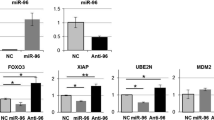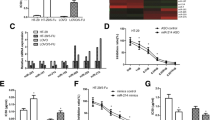Abstract
MicroRNAs (miRNAs) are short non-coding RNAs that regulate gene expression through the endogenous RNA interference machinery. Treatments with combination of chemotherapy with surgery are essential for advanced-stage colorectal cancer. However, the development of chemoresistance is a major obstacle for clinical application of anticancer drugs. In this study, we report a miR-203-SIK2 axis that involves in the regulation of Taxol sensitivity in colon cancer cells. MiR-203 is downregulated in human colon tumor specimens and cell lines compared with their normal counterparts. We report miR-203 is correlated with Taxol sensitivity: overexpression of miR-203 sensitizes colon cancer cells and the Taxol-resistant cells display downregulated miR-203 compared with Taxol-sensitive cells. We identify SIK2 as a direct target of miR-203 in colorectal cancer cells. Overexpression of miR-203 complementary pairs to the 3′ untranslated region (UTR) of SIK2, leading to the sensitization of Taxol resistant cells. In addition, miR-203 and the salt-inducible kinase 2 (SIK2) are reverse expressed in human colorectal tumors. Finally, we demonstrate recovery of SIK2 by overexpression of SIK2-desensitized Taxol-resistant cells, supporting the miR-203-mediated sensitization to Taxol, is through the inhibition of SIK2. In general, our study will provide mechanisms of the microRNA-based anti-tumor therapy to develop anti-chemoresistance drugs.





Similar content being viewed by others
References
da Costa Vieira RA, Tramonte MS, Lopes LF. Colorectal carcinoma in the first decade of life: a systematic review. Int J Colorectal Dis. 2015;30:1001–6.
Chung KY, Saltz LB. Adjuvant therapy of colon cancer: current status and future directions. Cancer J. 2007;13:192–7.
Edwards MS, Chadda SD, Zhao Z, Barber BL, Sykes DP. A systematic review of treatment guidelines for metastatic colorectal cancer. Color Dis. 2012;14:e31–47.
Troiani T, Martinelli E, Napolitano S, Morgillo F, Belli G, Cioffi L, et al. Molecular aspects of resistance to biological and non-biological drugs and strategies to overcome resistance in colorectal cancer. Curr Med Chem. 2014;21(14):1639–53.
Gustavsson B, Carlsson G, Machover D, Petrelli N, Roth A, Schmoll HJ, et al. A review of the evolution of systemic chemotherapy in the management of colorectal cancer. Clin Colorectal Cancer. 2015;14:1–10.
Goodwin RA, Asmis TR. Overview of systemic therapy for colorectal cancer. Clin Colon Rectal Surg. 2009;22:251–6.
Nehate C, Jain S, Saneja A, Khare V, Alam N, Dubey RD, et al. Paclitaxel formulations: challenges and novel delivery options. Curr Drug Deliv. 2014;11:666–86.
Kampan NC, Madondo MT, McNally OM, Quinn M, Plebanski M. Paclitaxel and its evolving role in the management of ovarian cancer. Biomed Res Int. 2015;2015:413076.
Xiao H, Verdier-Pinard P, Fernandez-Fuentes N, Burd B, Angeletti R, Fiser A, et al. Insights into the mechanism of microtubule stabilization by Taxol. Proc Natl Acad Sci U S A. 2006;103:10166–73.
Orr GA, Verdier-Pinard P, McDaid H, Horwitz SB. Mechanisms of Taxol resistance related to microtubules. Oncogene. 2003;22:7280–95.
Ameres SL, Zamore PD. Diversifying microRNA sequence and function. Nat Rev Mol Cell Biol. 2013;14:475–88.
Ha M, Kim VN. Regulation of microRNA biogenesis. Nat Rev Mol Cell Biol. 2014;15:509–24.
Hayes J, Peruzzi PP, Lawler S. MicroRNAs in cancer: biomarkers, functions and therapy. Trends Mol Med. 2014;20:460–9.
Lin S, Gregory RI. MicroRNA biogenesis pathways in cancer. Nat Rev Cancer. 2015;15:321–33.
Chang X, Sun Y, Han S, Zhu W, Zhang H, Lian S. MiR-203 inhibits melanoma invasive and proliferative abilities by targeting the polycomb group gene BMI1. Biochem Biophys Res Commun. 2015;56:361–6.
Wang C, Wang X, Liang H, Wang T, Yan X, Cao M, et al. miR-203 inhibits cell proliferation and migration of lung cancer cells by targeting PKCα. PLoS One. 2013;8, e73985.
Chiang Y, Song Y, Wang Z, Chen Y, Yue Z, Xu H, et al. Aberrant expression of miR-203 and its clinical significance in gastric and colorectal cancers. J Gastrointest Surg. 2011;15:63–70.
Zhang Z, Zhang B, Li W, Fu L, Fu L, Zhu Z, et al. Epigenetic silencing of miR-203 upregulates SNAI2 and contributes to the invasiveness of malignant breast cancer cells. Genes Cancer. 2011;2:782–91.
Xiang J, Bian C, Wang H, Huang S, Wu D. MiR-203 down-regulates Rap1A and suppresses cell proliferation, adhesion and invasion in prostate cancer. J Exp Clin Cancer Res. 2015;34:8.
Zhang F, Yang Z, Cao M, Xu Y, Li J, Chen X, et al. MiR-203 suppresses tumor growth and invasion and down-regulates MiR-21 expression through repressing Ran in esophageal cancer. Cancer Lett. 2014;342:121–9.
Li J, Chen Y, Zhao J, Kong F, Zhang Y. miR-203 reverses chemoresistance in p53-mutated colon cancer cells through downregulation of Akt2 expression. Cancer Lett. 2011;304:52–9.
Zhou Y, Wan G, Spizzo R, Ivan C, Mathur R, Hu X, et al. miR-203 induces oxaliplatin resistance in colorectal cancer cells by negatively regulating ATM kinase. Mol Oncol. 2014;8:83–92.
Ju SY, Chiou SH, Su Y. Maintenance of the stemness in CD44(+) HCT-15 and HCT-116 human colon cancer cells requires miR-203 suppression. Stem Cell Res. 2014;12:86–100.
Funamizu N, Lacy CR, Kamada M, Yanaga K, Manome Y. MicroRNA-203 induces apoptosis by upregulating Puma expression in colon and lung cancer cells. Int J Oncol. 2015;47:1981–8.
Li J, Zhu S, Tong J, Hao H, Yang J, Liu Z, et al. Suppression of lactate dehydrogenase A compromises tumor progression by downregulation of the Warburg effect in glioblastoma. Neuroreport. 2016;27:110–5.
Ahmed AA, Lu Z, Jennings NB, Etemadmoghadam D, Capalbo L, Jacamo RO, et al. SIK2 is a centrosome kinase required for bipolar mitotic spindle formation that provides a potential target for therapy in ovarian cancer. Cancer Cell. 2010;18:109–21.
Bon H, Wadhwa K, Schreiner A, Osborne M, Carroll T, Ramos-Montoya A, et al. Salt-inducible kinase 2 regulates mitotic progression and transcription in prostate cancer. Mol Cancer Res. 2015;13:620–35.
Acknowledgments
The authors would like to acknowledge all the staff and faculty working in China-Japan Union Hospital of Jilin University. We thank Dr. Xuebo Chen for providing the colorectal tumor patient samples at Department of General Surgery, China-Japan Union Hospital of Jilin University. This project is supported by the Dr. Bethune youth scientific research funds from Jilin University.
Author contributions
Y.L., S.G., and X.F. designed research; Y.L., S.G., X.C., M.L., and C.M. performed research; Y.L., S.G., X.C., M.L., C.M., and X.F. analyzed data; and Y.L., S.G., X.C., and X.F. wrote the paper.
Author information
Authors and Affiliations
Corresponding author
Ethics declarations
This study was approved by the Medical Ethics Committee of the Department of General Surgery, China-Japan Union Hospital of Jilin University, Changchun, Jilin Province, People’s Republic of China, and written informed consent was obtained from the patients or their parents prior to sample collection.
Conflicts of interest
None
Rights and permissions
About this article
Cite this article
Liu, Y., Gao, S., Chen, X. et al. Overexpression of miR-203 sensitizes paclitaxel (Taxol)-resistant colorectal cancer cells through targeting the salt-inducible kinase 2 (SIK2). Tumor Biol. 37, 12231–12239 (2016). https://doi.org/10.1007/s13277-016-5066-2
Received:
Accepted:
Published:
Issue Date:
DOI: https://doi.org/10.1007/s13277-016-5066-2




